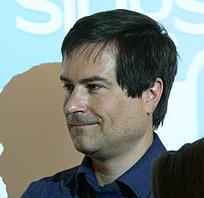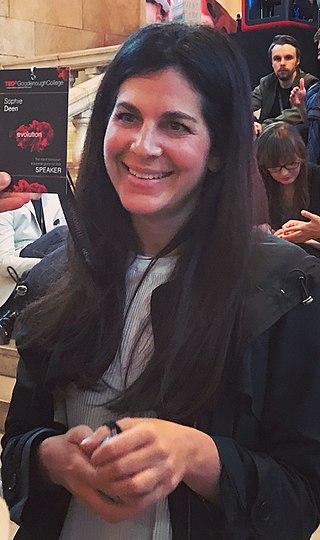
The Alabama School of Mathematics and Science (ASMS) is a public residential high school in the Midtown neighborhood of Mobile, Alabama. ASMS is a member of the National Consortium of Secondary STEM Schools (NCSSS). It graduated its first class in 1993.

David John Braben is a British video game developer and designer, founder and President of Frontier Developments, and co-creator of the Elite series of space trading video games, first published in 1984. He is also a co-founder of and works as a trustee for the Raspberry Pi Foundation, which in 2012 launched a low-cost computer for education.

Computer literacy is defined as the knowledge and ability to use computers and related technology efficiently, with skill levels ranging from elementary use to computer programming and advanced problem solving. Computer literacy can also refer to the comfort level someone has with using computer programs and applications. Another valuable component is understanding how computers work and operate. Computer literacy may be distinguished from computer programming, which primarily focuses on the design and coding of computer programs rather than the familiarity and skill in their use. Various countries, including the United Kingdom and the United States, have created initiatives to improve national computer literacy rates.

Margaret Elizabeth Philbin OBE is an English radio and television presenter whose credits include Tomorrow's World, Multi-Coloured Swap Shop and latterly Bang Goes the Theory.

Susan Elizabeth Black is a British computer scientist, academic and social entrepreneur. She is known for saving Bletchley Park, with her Saving Bletchley Park campaign. Since 2018, she has been Professor of Computer Science and Technology Evangelist at Durham University. She was previously based at the University of Westminster and University College London.
Dexter Industries is a company that designs robots for education, research, and personal use. The company makes several products that expand the LEGO Mindstorms, Raspberry Pi, and Arduino prototype system.

Raspberry Pi is a series of small single-board computers (SBCs) developed in the United Kingdom by Raspberry Pi Ltd in association with Broadcom. The Raspberry Pi project originally leaned toward the promotion of teaching basic computer science in schools. The original model became more popular than anticipated, selling outside its target market for uses such as robotics. It is widely used in many areas, such as for weather monitoring, because of its low cost, modularity, and open design. It is typically used by computer and electronic hobbyists, due to its adoption of the HDMI and USB standards.

Bodhi Linux is a light-weight Linux distribution based on Ubuntu that uses an Enlightenment DR17-based fork called Moksha. The philosophy for the distribution is to provide a minimal base system so that users can install the software they want. In turn, the distribution only includes software that is essential to most users, such as a file manager (Thunar), a terminal emulator (Terminology), and a web browser. To install additional software, Bodhi Linux developers maintain a browser-based app store that uses apturl to install programs.

The Raspberry Pi Foundation is a charity registered in England and Wales, as well as a UK company limited by guarantee. It was founded in 2009 to promote the study of computer science. It is part of a group that comprises legal entities in India, Ireland, and the United States, which carry out educational activities in those jurisdictions; and Raspberry Pi Ltd, a commercial subsidiary that develops Raspberry Pi computers and other hardware. The foundation’s charitable activities are funded through a combination of Gift Aid from the profits of Raspberry Pi Ltd, contracts for the delivery of educational services e.g. professional development for teachers, and donations from individuals, foundations, and other organisations.

Eben Christopher Upton is the Welsh CEO of Raspberry Pi (Trading) Ltd., which runs the engineering and trading activities of the Raspberry Pi Foundation. He is responsible for the overall software and hardware architecture of the Raspberry Pi device. He is a former technical director and ASIC architect for Broadcom.

Raspberry Pi OS is a Unix-like operating system based on the Debian Linux distribution for the Raspberry Pi family of compact single-board computers. First developed independently in 2012, it has been produced as the primary operating system for these boards since 2013, distributed by the Raspberry Pi Foundation.

Charles Russell Severance, popularly known as Dr Chuck, is an American computer scientist and academic who currently serves as Clinical Associate Professor of Information at the University of Michigan, he runs https://www.wa4e.com/.

Gillian Arnold is a British Information technology leader. She is a BCS Vice President and the Past Chair of the BCSWomen Specialist Group that supports women in the IT industry. In 2015, she was identified as the 9th Most Influential Women in UK IT 2015, by Computer Weekly. In 2016, Arnold was again identified as one of the 50 most influential women in UK IT 2016 by Computer Weekly.

The Micro Bit is an open source hardware ARM-based embedded system designed by the BBC for use in computer education in the United Kingdom. It was first announced on the launch of BBC's Make It Digital campaign on 12 March 2015 with the intent of delivering 1 million devices to pupils in the UK. The final device design and features were unveiled on 6 July 2015 whereas actual delivery of devices, initially planned for September 2015 to schools and October 2015 to general public, began on 10 February 2016.

Thonny is a free and open-source integrated development environment for Python that is designed for beginners. It was created by Aivar Annamaa, an Estonian programmer. It supports different ways of stepping through code, step-by-step expression evaluation, detailed visualization of the call stack and a mode for explaining the concepts of references and heap.

Sophie Deen is a British children's author and leader in the field of coding and STEM for young people. She is the CEO of Bright Little Labs, a kids media company that makes animations, books, games and toys with a focus on 21st century skills, inclusive role models, and sustainability.

CircuitPython is an open-source derivative of the MicroPython programming language targeted toward students and beginners. Development of CircuitPython is supported by Adafruit Industries. It is a software implementation of the Python 3 programming language, written in C. It has been ported to run on several modern microcontrollers.

Clare Sutcliffe MBE is a social entrepreneur and the co-founder of Code Club. She was awarded an Order of the British Empire in 2015.
Susan Sentance is a British computer scientist, educator and director of the Raspberry Pi Foundation Computing Education Research Centre at the University of Cambridge. Her research investigates a wide range of issues computer science education, teacher education and the professional development of those teaching computing. In 2020 Sentance was awarded a Suffrage Science award for her work on computing education.


















